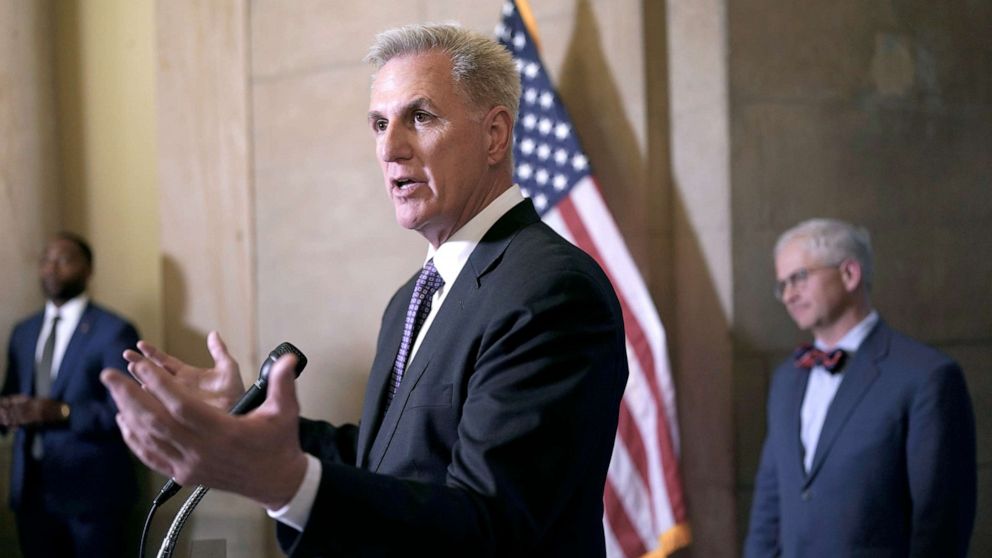华盛顿在一周多一点的时间内努力达成债务上限协议,直到潜在违约谈判中的一个关键问题是“工作要求”。
共和党人长期以来一直寻求对医疗补助和其他联邦援助项目的接受者施加更严格的条件,现在成为债务上限僵局的焦点。
众议院议长凯文·麦卡锡将更严格的工作要求描述为他与总统正在进行的谈判中的一条“红线”乔·拜登以降低联邦支出来换取解决债务上限问题。
“我们希望让人们摆脱贫困,找到工作。麦卡锡周一晚上在白宫会见拜登后对记者说:“这只是为那些身体健全、没有家眷的人准备的。”。
“我不认为我们从中国借钱给那些没有家眷、身体健全、能坐在沙发上的人是正确的,”麦卡锡补充道,这是共和党领导人最近几天使用的一句话。

众议院议长凯文·麦卡锡在他的办公室外与记者交谈,此前他在白宫与乔·拜登总统就政府债务上限的僵局进行了讨论...显示更多undefined
J.斯科特·阿普尔怀特/美联社
然而,一些民主党人表示,共和党提出的工作要求是不可行的。
随着会谈的继续,以下是需要了解的内容。
工作需求会节省多少钱?
当麦卡锡坚持工作要求时,一份来自无党派人士的分析国会预算办公室发现中概述的变化限制、节约、增长法案将在未来十年减少1200亿美元的联邦支出。
这是一个相对较小的数额,仅占该法案预计在此期间节省的4.8万亿美元总成本的2.5%。
共和党的法案将提高医疗补助、贫困家庭临时援助(TANF)和补充营养援助计划(SNAP)的一些接受者的工作要求。
最大的节省(1090亿美元)将来自医疗补助的变化,这将要求身体健全的成年人每月参加至少80小时的工作相关活动。据CBO称,这些突然的变化将节省110亿美元,而TANF的变化将节省60亿美元。
该机构估计,平均而言,这些变化将导致约60万人没有保险,27.5万人失去SNAP福利。
拜登说过的话
拜登为考虑一些工作要求敞开了大门,但坚称它们不会影响人们的医疗保健或任何其他“后果”领域。
“我不会接受任何会影响人们医疗健康需求的工作要求,”拜登上周表示。“我不会接受任何超出现有范围的工作要求——我多年前就投票支持现有的工作要求。但有可能还有其他一些人,但不会有任何影响。”
麦卡锡随后对拜登的评论一笑置之,在新闻发布会上说:“任何有后果的事情?这就是投票支持工作要求的参议员。”
这个问题会威胁到拜登和麦卡锡之间的任何协议吗?
几位进步民主党人告诉美国广播公司新闻资深国会记者雷切尔·斯科特,额外的工作要求在抵达时就已经死亡。
“我不能支持工作要求,额外的工作要求,这只会剥夺福利,”加利福尼亚州民主党众议员Ro Khanna说。
当被问及她是否会支持更严格的要求时,纽约州民主党众议员亚历山大·奥卡西奥-科尔特斯(Alexandria Ocasio-Cortez)直截了当地说“不会”。另一位纽约州民主党众议员贾马尔·鲍曼(Jamaal Bowman)也拒绝支持此类条款。
“我和我们的许多同事看到同样的人现在上蹿下跳地说,我们必须做所有这些事情,这真的让我大吃一惊。上一任总统在的时候你怎么不说?”密歇根州众议员拉什纳·特莱布说。
进步派和保守派强硬派都表示反对拜登和麦卡锡之间正在进行的会谈。这意味着无论达成什么协议,两位领导人都需要两党中的温和派支持。
“我认为在其他项目上可能会有一些共同点和一点点改变。如果这就是避免违约的代价,违约的悲剧将会瞬间影响数百万人的生活。这就是我们不得不悲哀地权衡的,”明尼苏达州温和派民主党众议员迪恩·菲利普斯(Dean Phillips)说。
当我问他是否愿意接受更严格的工作要求时,菲利普斯回答说,“在这一点上,我愿意接受任何事情,以避免违约。”
'Work requirements' emerge as flashpoint in debt ceiling, spending talks
As Washington struggles to reach a debt ceiling deal with little more than a week untilpotential default, a key hangup in the negotiations is turning out to be -- "work requirements."
A long-sought effort by Republicans to impose stricter conditions on recipients of Medicaid and other federal assistance programs is now front-and-center in the debt ceiling standoff.
House Speaker Kevin McCarthy has described tougher work requirements as a "red line" in his ongoing negotiations with PresidentJoe Bidento reduce federal spending in exchange for addressing the debt ceiling.
"We want to take people from poverty to jobs. It is only for people who are able-bodied with no dependents," McCarthy told reporters Monday evening after he met with Biden at the White House.
"I don't think it's right that we borrow money from China to pay somebody who has no dependents, able-bodied to sit on a couch," McCarthy added, using a line used by leading Republicans in recent days.
Several Democrats, however, have said the GOP's proposed work requirements are a nonstarter.
Here's what to know as talks continue.
How much money would work requirements save?
As McCarthy digs in his heels on work requirements, an analysis from the nonpartisanCongressional Budget Office foundthe changes outlined in theLimit, Save, Grow Actwould reduce federal spending by $120 billion over the next decade.
That's a relatively small amount, just 2.5%, of the $4.8 trillion total the bill is projected to save in costs over that timespan.
The Republican bill would ramp up work requirements for some recipients of Medicaid, Temporary Assistance for Needy Families (TANF) and Supplemental Nutrition Assistance Program (SNAP).
The most savings ($109 billion) would come from the Medicaid changes, which would require able-bodied adults to participate in work-related activities for at least 80 hours per month. The SNAP changes would save $11 billion and TANF changes $6 billion, according to the CBO.
The agency estimated the changes would result, on average, in about 600,000 people becoming uninsured and 275,000 losing SNAP benefits.
What Biden has said
Biden opened the door to considering some work requirements but insisted they wouldn't affect people's health care or any other area of "consequence."
"I'm not going to accept any work requirements that's going to impact on medical health needs of people," Biden said last week. "I'm not going to accept any work requirements that go much beyond what is already -- I voted years ago for the work requirements that exist. But it's possible there could be a few others, but not anything of any consequence."
McCarthy subsequently laughed off Biden's comments, saying at a press conference: "Anything that has consequences? This is the senator who voted for work requirements."
Will the issue threaten any deal between Biden and McCarthy?
Several progressive Democrats told ABC News Senior Congressional Correspondent Rachel Scott that additional work requirements were dead on arrival.
"I cannot support work requirements, additional work requirements, which are just going to take away benefits," said Rep. Ro Khanna, D-Calif.
Rep. Alexandria Ocasio-Cortez, D-N.Y., when asked if she would support stricter requirements, gave a flat out "no." Rep. Jamaal Bowman, another New York Democrat, also shut down supporting such provisions.
"It's really taken aback for me and many of our colleagues that have seen the same people that are now jumping up and down and saying, We got to do all these things. Why didn't you say it when the previous president was there?" Rep. Rashina Tlaib, D-Mich., said.
Progressives and conservative hardliners have voiced opposition to the ongoing talks between Biden and McCarthy. That means both leaders will need the moderates in both parties to back whatever deal emerges.
"I think there might be some common ground and a modicum of change to other programs. If that's what it takes to avoid default, the tragedy of default will affect millions of lives instantaneously. And that's what we're gonna have to weigh sadly," said Rep. Dean Phillips, a moderate Democrat from Minnesota.
When I asked if he is open to stricter work requirements, Phillips replied, "I'm open to anything at this point, to avoid default."






